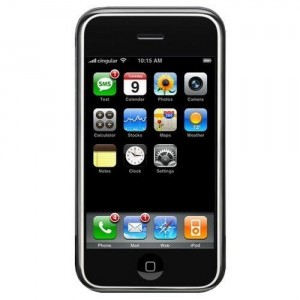All my students know that I hold cell phone and cable companies in a special place of dishonor because of the apparent unfairness of the contracts that we all sign with these companies. It seems half my paycheck goes to pay for my cell phone and TV, but like the rest of you, I could no sooner give up my iPhone than stop going to Starbucks.
One of your classmates sent me this great article about a bold and risky move by T-Mobile to disrupt the cell phone industry. T-Mobile is doing away with the oppressive two-year contract. Typically, you repay the cost of your phone in addition to paying for the service, but then keep paying the same high monthly fee for the rest of eternity (or two years). T-Mobile will now offer the option to pay more for your cell phone, but then pay a lower monthly rate, with no long term obligation. The company is also doing kind things like letting you go down to a slower internet speed once you use up your monthly data, rather than paying so much extra, and eliminating voice prompts that take up air time.
Of course the reason T-Mobile can or has to take all these radical steps is because it is in last place in the industry. I could care less why they do it (take that, Kant!); I just want the company’s disruptive choices to put pressure on the big carriers to make the same changes. Today, I love T-Mobile. My favorite line from the article: “Someone should organize a parade.”


6 Comments
Ronen Ben Yehuda posted on April 7, 2013 at 12:30 pm
Really interesting article, totally agree with the arguments made. I was just talking to my uncle the other day, and he was excited that he was able to purchase an Iphone 4G for my cousin for just $0.99! It did not really make sense to me at first, but then when he went on to explain that in addition to the $0.99 he had to sign a contract with several fees, it all made sense. Phone services in the US are very unique – the way it works in Europe is totally different. There are no things such as contracts, downpayments, or never-ending monthly rates. The vast majority of cell phone users in Europe pays a large sum for the actual device (Iphones are extremely expensive) and then they buy cards with codes that entitles them to buy minutes for their phones. Once the user goes over the minutes he had filled the phone with, he will need to buy a new card and recharge the phone with new minutes. Although it can be pretty annoying to constantly go and recharge your phone with minutes, it has the advantages of not being tied to any sort of contract, as well as the possiblity of better monitoring your cell phone usage
Yang Liu Steve posted on April 16, 2013 at 8:39 pm
I think my classmate above makes a good point. U.S. carrier are crazy. Nothing else in this world work like them. The reason they have been like that is because people here in U.S. doesn’t like to pay for the phone. (what i mean is the actual phone). As a results, the carrier have to pay the cell phone manufactory the difference. (Take the iPhone 5 as an example, it costs $199 here, but around $700 in China and the rest of the world). The 500 hundred difference is the money the carrier try to make on the customers. So, they must have contract to ensure their customer stay with them. It seems that T-mobile is try to do what the rest of the world do, but I just can’t see how its going to work well here in the U.S.. Again, people here doesn’t like to pay for their phones, as soon as they see a higher price phone they would leave. They would go to AT&T with a free phone , choice to go with the contact. Then, they are going to say the contract is unfair, but next time they want a new phone, they will still go with the contact…..
Alicia Schaefer posted on April 18, 2013 at 11:20 am
I have had to pay for my own cell phone service since the beginning of time. I have never given into the big companies’ rip off plans. My first phone was a prepaid T-Mobile ghetto flip-phone that was still pretty expensive and I paid for it text by text and minute by minute. I ended up accidentally throwing that bad boy in a cup of hot chocolate so I refrained from trusting myself with another phone again until I was a senior in high school. When I initially looked into getting a plan for myself, I was outraged by the unavoidable hiked prices so I looked into other means. I came across Virgin Mobile which is a prepaid cell phone company that is owned by Sprint. I thought I would give it a try since it was only $25 for unlimited texting and 200 minutes a month. Surprisingly, Virgin Mobile had Blackberrys and a lot of LG phones as well. However, you had to pay the full face value of the phone. I ended up buying a Blackberry for $300 and only paid $25 a month; meanwhile, my friends with similar plans were playing over $50 for the same thing. Now I have an iPhone 4s which I paid $550 for and am paying only $30 a month for unlimited data, unlimited texting and 200 minutes a month; meanwhile, my friends are paying at least $80 a month for the same exact thing. Although I had to pay for the phone upfront in exchange for half the monthly price, I am still saving about $1500 over 2 years by having prepaid than I would if I bought a plan from AT&T or Verizon. I am not surprised that T-Mobile is being the first big cell provider to throw in the towel because they had the highest prices and I honestly thought they had gone out of business a couple of years ago. I think it is a huge relief that they are attempting to force the other companies to lower their prices as well. I have a little more respect for T-Mobile now. Prepaid is the way to go!
Robin Wan posted on April 27, 2013 at 9:13 pm
This article really interesting and reminds me of the massive cell phone bill each month. I have been with AT&T for almost 10 years now, from the time I only had a black and white phone to a high-tech iphone that everyone has. I feel that what T-Mobile may revolutionize the cell phone industry by returning the power to the consumers and putting an end to the contract system. But I doubt that it would influence other cell phone companies, because their customers are indifferent about the data plan cost after paying for it for so many years. Between the choice of paying the phone upfront without monthly fees, many would rather pay for it at the purchase.On the other hand, many uninformed users would have an impulse to buy a phone that costs virtually nothing and be paying a monthly fee every month for at least the next 24 months. I applaud what T-Mobile is doing by returning the power of choice to the consumers and, hopefully, other companies will soon follow.
Paige Stefanik posted on October 6, 2013 at 4:42 pm
Questa è davvero una buona lettura per me. Dovrà accettare che tu sei uno dei blogger più cool che abbia mai visto. Grazie per aver postato questa informazione utile. Questo era proprio quello che ero in cerca di. Tornerò a questo blog di sicuro!
Kathryn C. Hazel posted on November 25, 2022 at 2:39 am
lEST hOME